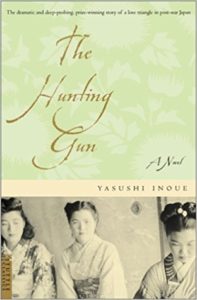The Hunting Gun
Yasushi Inoue
 A man who calls himself Josuke Misugi recognizes himself as the figure described in a poem published in a hunting magazine. He writes to the poet and sends him three letters he had received from the three most important women in his life.
A man who calls himself Josuke Misugi recognizes himself as the figure described in a poem published in a hunting magazine. He writes to the poet and sends him three letters he had received from the three most important women in his life.
Saiko, Josuke’s wife, found out the identity of his long-term lover, and now wants a divorce. In a matter-of-fact way she not only tells him what she has chosen from their property, but also that she had been unfaithful as well for years.
Midori, Josuke’s lover and cousin of Saiko, has been sick for a long time. When Saiko finds out about the affair with her husband, Midori is ready to put a long intended plan into action. She writes a last letter to Josuke and then poisons herself.
Shoko, Midori’s daughter, finds her mother’s diary and is shocked to learn about the affair. Finding it hard to deal with it, she decides to end all contact with both Josuke and Midori.
The three letters tell the story of not only the three women’s, but also of Josuke’s life, and the only things we hear about him are seen from their perspective. The main themes of the novel are love and loneliness, and how the former may lead to the latter.
Of all the four people involved, I mostly felt for Shoko. Finding her mother’s diary and seeing how she had suffered emotionally for so long, almost leads to Shoko’s own breakdown. Shoko’s letter feels the most distressing of the three, her new and thus still raw feelings are expressed beautifully and perfectly by the author.
Yasushi Inoue (1907 – 1991) was born in Hokkaido and studied history and art at Kyoto University. He started writing very late, and his first short stories were published in 1949; they won him the Akutagawa Prize one year later. In the 40 years until his death, he was one of the most prolific writers of Japan, he published many short stories, but also full size novels. He is most famous for his accurate historical fiction and is still one of the most read Japanese authors in Germany.
Check the book out on amazon.
